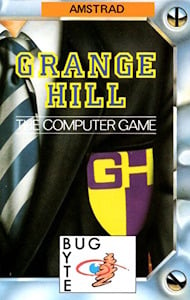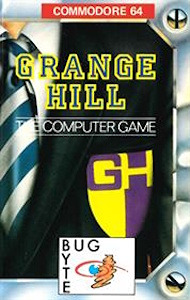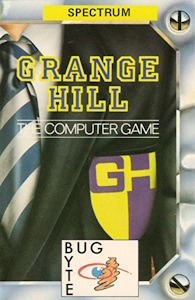Grange Hill (1987-)
Grange Hill was developed by Binary Design and published by Argus Press Software in 1987, based on the long-running BBC television drama of the same name. It was released for the ZX Spectrum, Commodore 64, and Amstrad CPC, with each version retaining the same broad premise but varying slightly in presentation and performance. The game was part of a late-1980s wave of British TV tie-ins, aiming to tap into the popularity of well-known shows to attract audiences who might not otherwise be dedicated gamers.
Set within and around the fictional Grange Hill school, the game follows student Gonch Gardner on a mission to retrieve his confiscated personal stereo from the headmaster’s office. The storyline draws directly from the mischievous and sometimes rebellious tone of the television series, which often focused on the antics, dilemmas, and everyday challenges faced by schoolchildren. This setup provides a straightforward yet character-driven objective that players can immediately connect with.
Gameplay combines adventure and puzzle elements, requiring the player to explore different locations, collect useful items, and interact with various characters while avoiding teachers and prefects who might catch them. The ZX Spectrum and Amstrad versions featured colourful but blocky visuals, while the Commodore 64 version included a more detailed sprite style. The soundtrack was particularly notable on the Commodore 64, where musician David Whittaker produced an 8-bit interpretation of the show’s theme tune, adding a touch of authenticity to the adaptation.
Grange Hill was promoted primarily through coverage in UK gaming magazines, often highlighting its BBC licence and the popularity of the TV programme. While some reviewers appreciated the humour and familiarity of the setting, others criticised the slow pace and trial-and-error gameplay. It did not lead to any sequels, and no direct prequel existed, leaving the title as a one-off representation of the Grange Hill universe in gaming. Today, it is remembered as a curious example of 1980s British television making the jump to home computers, reflecting the era’s fascination with licensed properties.
Images from MobyGames
Buy Grange Hill
Click one of the Ebay or Amazon buttons below to check the latest prices and purchase Grange Hill for that particular platform.



Related Searches
Grange Hill is available to purchase and download from a range of vendors. Always shop....
Grange Hill may be available to download as abandonware from one of the many sites that offer this...
There are various sites out there that can offer cheat codes for games. Search now to find all available...
There are many sites out there that have collated and documented historic reviews of this game. Search now...
We don't host or link to rom sites for this game. However, there are many sites out there that may be...
The initial release date for Grange Hill is stated as some time during 1987. Other ports of the game may....
Grange Hill is available to purchase and download from the link(s) shown further up this....
There are multiple sites around the internet that offer visual guides to this game. Search now to find the....








